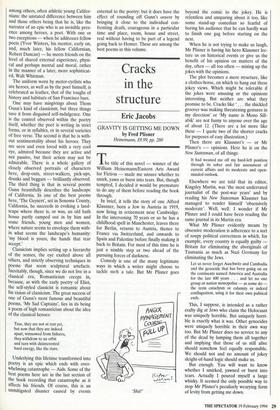Cracks in the structure
Eric Jacobs
GRAVITY IS GETTING ME DOWN by Fred Plisner Heinemann, £9.99, pp. 280
The title of this novel — winner of the William Heinemann/Eastern Arts Award for Fiction — made me unsure whether to smirk, yawn or burst into tears. But, though tempted, I decided it would be premature to do any of them before reading the book through.
In brief, it tells the story of one Alfred Klausner, born a Jew in Austria in 1919, now living in retirement near Cambridge. In the intervening 70 years or so he has a childhood spell in Manchester, leaves there for Berlin, returns to Austria, thence to France via Switzerland, and onwards to Spain and Palestine before finally making it back to Britain. For most of this time he is just a nimble step or two ahead of the pursuing forces of darkness.
Comedy is one of the many legitimate ways in which a writer might choose to tackle such a tale. But Mr Plisner goes beyond the comic to the jokey. He is relentless and unsparing about it too, like some stand-up comedian so fearful of boring his audience that he can hardly wait to finish one gag before starting on the next.
When he is not trying to make us laugh, Mr Plisner is having his hero Klausner lec- ture us on historical events or give us the benefit of his opinion on matters of the day, often — all too often — mixing up the jokes with the opinions.
The plot becomes a mere structure, like a clothes-horse, on which to hang out these jokey views. Which might be tolerable if the jokes were amusing or the opinions interesting. But neither are what they promise to be. Cracks like ' . . . the shickled groover was making threatening gestures in my direction' or 'My name is Mono Sill- abik' are not funny to anyone over the age of about 12. (There are a lot more like these — I quote two of the shorter cracks for purposes of easy illustration.) Then there are Klausner's — or Mr Plisner's — opinions. Here he is on the New Statesman, of all things:
It had weaned me off my hard-left position through its sober and fair assessment of current affairs and its moderate and open- minded outlook.
Elsewhere we are told that its editor, Kingsley Martin, was 'the most underrated journalist of the post-war years' and by reading his New Statesman Klausner has managed to render himself 'obsessively moderate'. Well, well. I wonder if Mr Plisner and I could have been reading the same journal in its Martin era.
What Mr Plisner evidently means by obsessive moderation is adherence to a sort of soupy political correctness in which, for example, every country is equally guilty Britain for eliminating the aboriginals of Tasmania as much as Nazi Germany for eliminating the Jews.
Let us never forget Auschwitz and Cambodia and the genocide that has been going on on the continents named America and Australia for the last 400 years . . . and let no one group or nation monopolise — as some do the term cataclysm or calamity or indeed conflagration, using it for their own political ends.
This, I suppose, is intended as a rather crafty dig at Jews who claim the Holocaust was uniquely horrible. But uniquely horri- ble is exactly what it was. Other genocides were uniquely horrible in their own way too. But Mr Plisner does no service to any of the dead by lumping them all together and implying that those of us still alive should somehow feel equally responsible. We should not and no amount of jokey sleight-of-hand logic should make us.
But enough. You will want to know whether I smirked, yawned or burst into tears. Actually I poured myself a large whisky. It seemed the only possible way to stop Mr Plisner's peculiarly wearying form of levity from getting me down.


















































 Previous page
Previous page